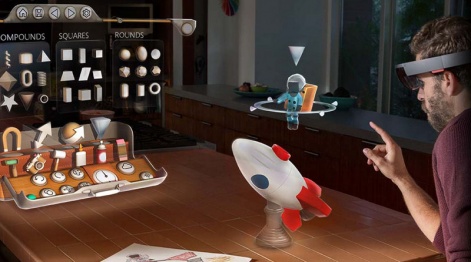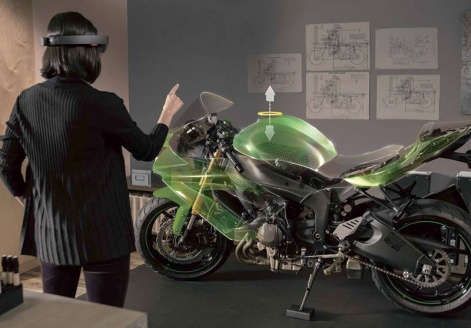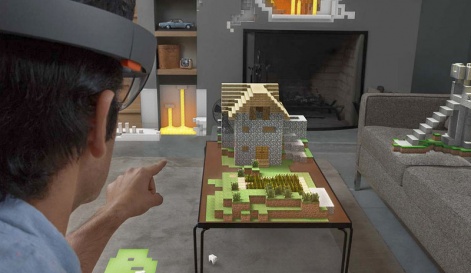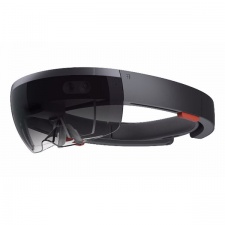When the Microsoft Natal - which later became the Kinect - was revealed, we thought computing and gaming were never going to be the same again.
Few of its early tech demos, like the Milo AI game characters and flawless motion controls, really delivered, however.
Now Microsoft is back with another equally revolutionary interactive concept, the HoloLens.
But is this one different? Could the HoloLens deliver on its early promises?
Given that the headset effectively upstaged Windows 10 at its own unveiling, it seems entirely possible that Microsoft, either through great timing or good luck (or both), once again has a product that the world desires.
An augmented life
The HoloLens diverges from the virtual reality trend we've been getting very excited about lately by shifting the typical head-mounted display (HMD) toward augmented reality.
Generally AR has made use of cameras and touchscreens to overlay images onto the real world, and at first it would seem like this is a much easier option than a fully immersive HMD like the Oculus Rift.
Yet Microsoft's proposals for theHoloLens belies this.
If all goes as planned, these AR holograms will be hooked right into our everyday computing lives.

Its use, via a range of holographic APIs that include voice recognition and 3D scanning of the user's environment, will be built right into Windows 10. Furthermore, Windows 10 will span all Microsoft devices from computers to phones and game consoles, and potentially even scrapping the screen altogether to interface purely via theHoloLens.
The extent of a HoloLens app's cross-device compatibility is yet to be seen, but its big unveiling suggested that one Windows 10 holographic app will rule them all.
We have to wonder how many different HMDs people will be willing to buy.
And that's got to have an immediate appeal to any developer who's considering embracing the platform.
Minecraft was drafted in to demonstrate how a holographic game might work, and seeing its interactive building blocks scattered around your living room, desk and furniture is a seductive prospect.
Virtual screens and other ephemeral objects can be attached to real-world locations within the HoloLens experience, so you can set up your digital boardgame on the coffee table, for example, and that's where it stays.
Blocking out the world around us, as virtual reality has been working to hard to achieve, suddenly seems like it might not be such a practical approach.
Which reality is this anyway?
The next words we'd expect to hear from Oculus, and others in the virtual reality world, are likely to be reassurances that HoloLens and VR are very different things. And Microsoft will likely back that up.
It will need to drive that message hard, because we have to wonder how many different HMDs people will be willing to buy.

Oculus and HoloLens might offer different experiences on a macro level, but they're all going to be close enough that justifying two or more major purchases will be difficult. Like owning both an Xbox One and a PS4, or an iPhone and an Android smartphone, it's very hard for people to reconcile that kind of decision in the current economic climate.
During its presentation, Microsoft 'humbly' invited the likes of Oculus to join it in making holographic apps. The message was a thinly veiled warning not to go head-to-head in terms of multi-reality games competition.
There'll be stumbling blocks, of course; Windows 10 perhaps being one of the most significant.
The timing of Google decision to suspend its Glass project now suggests Google caught wind of HoloLens and decided this was a fight that Glass couldn't win.
And although Magic Leap has enjoyed keeping everyone in the dark about its own intentions in the realm of AR and VR, we're willing to bet that Microsoft has just rained on its marketing parade too.
No matter how effective Magic Leap's gear might prove to be, it's now always going to be following in Microsoft's footsteps - virtually speaking, anyway.
All of which brings us back to whether or not HoloLens will deliver on its early, yet lofty, promises.
There's a confidence behind this unveiling that suggests Microsoft is confident it will.
The HoloLens is undeniably exciting, and although we'll reserve judgement for a while longer yet, it already looks like it could be virtual reality's more advanced big brother.
Assuming Windows 10 doesn't hobble it, that is.
Broken windows
For Kinect didn't struggle, commercially, because the hardware was inadequate or the concept flawed. It just failed to ignite that essential spark of imagination in game developers needed to fuel the fires of their creativity.
The HoloLens is very similar, but already it appears that the industry is seeing it as a crucible in which their gaming dreams can be forged.

There'll be stumbling blocks, of course; Windows 10 perhaps being one of the most significant.
Microsoft, which owned the personal computing world not so long ago, has lost acres of ground to the likes of Apple, Linux, and even Google. If we go back to Windows on our PCs, purely because we want HoloLens (and we'll admit it - we do), does that also mean we need to consider replacing our Android smartphone and Chromebook with other Microsoft-powered devices?
Suddenly the casual desire to play with HoloLens becomes lot more complex if it means re-carpeting our entire digital world with the fabric of Windows 10.
After all, the very PC that's being used to write this feature ran like a knackered pig under Windows 7, and soared like an eagle with Linux, so what does that say about its ability to run Windows 10 and the HoloLens?
Right now, there's no way to answer that question, though a glimmer of hope can be seen in the headset's built-in CPU, GPU and HPU (holographic processing unit. Hmm...), which will presumably take some of the strain off an underpowered computer.
And it'll have to, should gaming prevail on the HoloLens. Games are well known as being a computer's most challenging undertaking, and making them holographic sounds even more burdensome.
There are a dozen other factors that'll determine the HoloLens's success, from price point to developer access and software distribution to monetisation options, but on face value we have to admit, this could be the most exciting device we've seen since Oculus Rift set Kickstarter ablaze.
The future suddenly looks very different.













